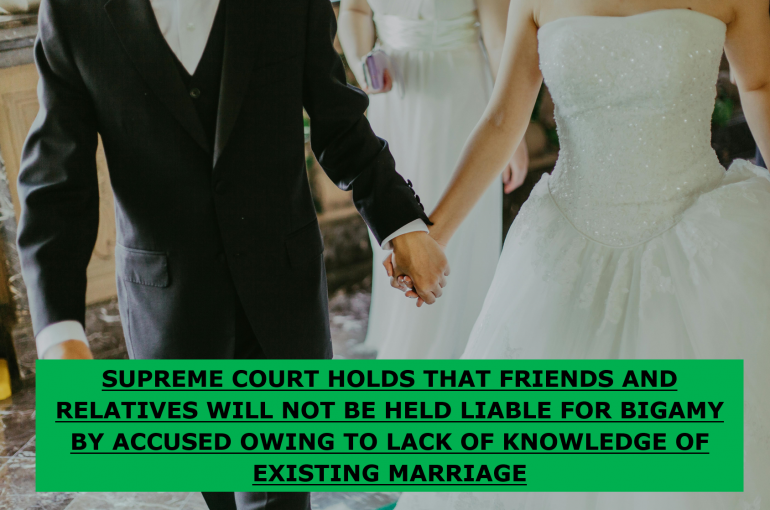SUPREME COURT HOLDS THAT FRIENDS AND RELATIVES WILL NOT BE HELD LIABLE FOR BIGAMY BY ACCUSED OWING TO LACK OF KNOWLEDGE OF EXISTING MARRIAGE
A two Judge Bench of the Hon’ble Supreme Court comprising of Justice B.R Gavai and Justice Sandeep Mehta passed a judgement dated 15.04.2024 in S. Nitheen v. State of Kerala SLP (Cr.) No. 8529 of 2019 wherein the Apex Court held that the mere presence of friends and relatives in the Accused’s second marriage does not establish any offence against them, unless the Complainant proves that they were aware of the Accused’s existing marriage.
Facts
The facts of the case are that the Complainant namely Mr. Reynar Lopez (Husband), who is the Respondent No.2 herein, married Accused No.1 namely Mrs. Lumina (Wife) on 16.04.2007. A Complaint was filed by Mr. Reynar Lopez on the ground that on 13.08.2010, the Accused No. 1 married another person (Accused No. 2) under the Special Marriage Act of 1954, even though she was already married to the Complainant.
It was also claimed that the friends and family (Appellants 3-7) of the Accused No. 1, were also responsible for the said offence of bigamy as they wanted the said marriage to happen. Hence, there was a common intention amongst Appellants 3-7 and thus they were liable for the commission of the offence of bigamy.
The Ld. Judicial Magistrate of First Class passed an Order dated 23.05.2018 in Criminal Case No. 791 of 2013 and framed charges against the Appellants under Section 494 of the Indian Penal Code 1860 (IPC) (Marrying again during lifetime of husband or wife) read with Section 34 IPC (Acts done by several persons in furtherance of common intention), on the basis of the evidence led on behalf of the Complainant.
The Order of the Ld. Magistrate was challenged by the Appellants in the Sessions Court and later in the High Court of Kerala in Crl. MC. No. 8108 of 2018 seeking quashing of the Order dated 23.05.2018 along-with criminal proceedings bearing Criminal Case No. 791 of 2013. However, the High Court rejected the contentions provided by the Appellants herein by passing a final judgement dated 03.07.2019. Therefore, aggrieved by the decision of the High Court, the Appellants approached the Apex Court.
Issues
Can the friends and relatives be charged for bigamy and common intention, if they were present at the time of second?
Decision by Supreme Court
The Supreme Court took consideration of the fact that the Complaint was filed under Sections 494 and 34 of IPC. However, the Magistrate only directed to charge the Accused persons under Section 494 IPC i.e. Bigamy.
Moreover, the Apex Court relied on the judgement of of Gopal Lal v. State of Rajasthan (1979) 2 SCC 170, wherein the essential elements of offence of Bigamy were laid down. The key ingredients are noted as follows:
“The essential ingredients of this offence are: (1) that the accused spouse must have contracted the first marriage (2) that while the first marriage was subsisting the spouse concerned must have contracted a second marriage, and (3) that both the marriages must be valid in the sense that the necessary ceremonies required by the personal law governing the parties had been duly performed.”
Thus, the Hon’ble Supreme Court provided that the decision formulating the charges against the Appellants (the Accused’s family members and relatives) contains a clear error because only the spouse (Wife) to the second marriage could have been charged with Bigamy.
The Bench noted that the Appellants were not charged for Abetment for Bigamy but only for having common intention. The Hon’ble Court also noted that in order to establish common intention, there is prima facie need to show that not only were the Appellants present at the bigamous wedding but also committed an overt act or omission to show their common intention towards the bigamy and the knowledge that the wife was already married.
The Court also placed reliance on the decision in Chand Dhawan(Smt) v. Jawahar Lal and Others (1992) 3 SCC 317 wherein it was held that the presence of the accused person in the second marriage cannot be assumed as an act of facilitating the offence of bigamy.
Thus, the Supreme Court, in the present case, proceeded to set aside the Impugned Order dated 03.07.2019 passed by the High Court and directed that the charges framed and the trial proceedings against the Appellants be quashed, except for the main Accused No. 1 i.e. the Wife.
Conclusion
The Supreme Court by allowing the Appeal filed by the relatives and friends of Accused No. 1, set aside the illegal proceedings that were carried on against the Appellants and further observed that such criminal proceedings against the Appellants was an abuse of process of Court.
The Apex Court also held that in order to bring the charge of common intention in the offence of bigamy, the presence and the overt act or omission of the relatives and friends in the second marriage must be proved, which the Complainant failed to prove against the Appellants in the present case.
As a result, the Supreme Court set aside the Impugned Order dated 03.07.2019 passed by the High Court and directed that the charges framed and the trial proceedings against the Appellants be quashed, except against the main Accused No. 1 i.e. the Complainant’s Wife.
ARJAV JAIN
ASSOCIATE
THE INDIAN LAWYER & ALLIED SERVICES





































Leave a Reply